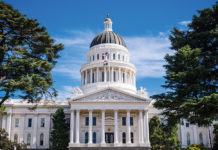Our new governor just proposed a budget with $12 billion in new
taxes for everyone and $12.5 billion in cuts to colleges, public
health programs, county and local city operations, local
redevelopment districts and other government services.
Normally this would not be a time for applause, but these are
not normal times.
California has sunk to the bottom of an ocean of debt over the
past eight years. The state’s budget debt went from $4 billion in
2004 to $8 billion by 2006 and $11 billion just two years ago.
This is not somebody else’s money; this is our debt and our tax
liability.
Today, the state’s budget debt is $25.4 billion for the next 18
months. Gov. Jerry Brown’s “tough budget for tough times” is aimed
at stopping the state’s plunge into deeper and deeper debt. But it
is only a minor first step, ready to be challenged by the state
legislators and by the voters who will be asked to vote yes in June
for $10 billion in new and continued taxes.
Faced with all of that, and more, we applaud Gov. Brown’s plain
talk and direct challenges.
“For 10 years we’ve had budget gimmicks and tricks that pushed
us deep into debt. We must return California to fiscal
responsibility and get our state on the road to economic recovery
and job growth,” Brown said on Monday as he released his budget to
the public. The governor is promising “painful cuts, requiring
sacrifices from every sector of the state.”
We see no other choice to his proposed mix of billions in
program cuts and five years of extended taxes, unless you favor
living at the bottom of an ocean, drowning in deeper and deeper
debt and pretending a lifeboat will be along any time now.
As promised, the November election has brought us the most
radical — and potentially most real — reform and change of
direction for our state government and fiscal future.
Not only do we have a new governor, but several other necessary
reforms are now moving forward.
The best outcome of the recent election is we are now having a
real and serious conversation about our fiscal crisis and
governmental dysfunction in Sacramento.
The conversation is becoming so real, that Gov. Brown and others
have willfully included talk about amending or repairing Prop. 13,
suggesting big corporations should not enjoy the same property tax
protections that private property owners require.
Voters in November granted the State Legislature to adopt new
budgets without a two-thirds super majority vote — the main source
of government gridlock in Sacramento since Prop. 13 was first
passed in 1978.
A new citizen’s panel this year will redraw legislative district
boundaries instead of letting incumbent politicians continue to
gerrymander “safe” districts to ease their own re-election.
All of these reforms are long overdue. And so is a
re-examination of Prop. 13. The passage of Prop. 13 began a radical
budgeting makeover. Homeowners won an annual 1-2 percent cap on
their property tax increases, but lost just about everything else,
including control of their schools, libraries and local
governments.
In his 2011-12 budget proposal, the “then-and-now” Gov. Brown is
proposing a return of local control for schools and all local
governments. If voters approve a series of extensions to sales,
vehicle and income taxes for five years, Gov. Brown is proposing to
fund K-12 schools at the current level, without more cuts.
If voters say no to the tax questions this June, local schools
could lose as much as $5.9 billion in funding for the coming
year.
Less state government interference and more local government
responsibilities for public health, welfare, criminal justice and
education will not come without a price — a price it is time to
admit we all must pay.
— Rollie Atkinson
50.1
F
Healdsburg
April 20, 2025







